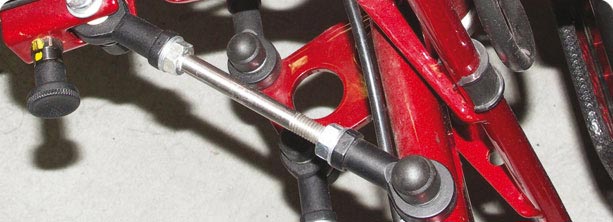
Special bikes and therapeutic accessories
Plain, spherical and linear bearings made of plastic help to improve mobility and the quality of lifeEnabling handicapped people to enjoy a wide range of mobility is the ultimate aim of this manufacturer of special bicycles. The demands on the products are correspondingly high. Among other things, they must be safe, ergonomic and durable. Their appearance also plays an important role in this challenging environment. The company has long since been using light, maintenance-free plain, spherical and linear bearings made of plastic. The machine components help to ensure sophisticated designs.
“Ultimate reliability is our main imperative,” is how Werner Müller, graduate in business administration and managing director of draisin GmbH, Achern, describes his firm's company and product philosophy. “Whether its a wheelchair or trike, partner or recumbent bike, two or three-wheeler tandem - our bikes help to make disabled people mobile. That is our passion! We are continually growing with the demands of our customers and today offer a comprehensive product range for all age groups. “
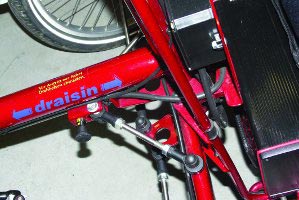
“igubal®” plastic rod end bearings for easily folding up the tricycle
For a number of years, various plastic bearings made by bearing specialist igus® GmbH, Cologne, have been used in the special bikes. In this case, the flexible profile round guide “DryLin® W” is used for the seat adjustment, “igubal®” spherical bearings to fold bikes together for easy transportation and “iglidur® G” spherical bushings for example in the pedals and the seat suspension. To ensure the quality of the frames, the variable “DryLin® W” measuring system also plays in important part. A PMA hose safely protects the brake and motor cables, whilst “DryLin® N”, a low profile guide, is fitted in a therapeutic aid – the so-called orthotic – for stroke patients. Many lubricant-free and wear-resistant plastic components therefore, which – over and above the application mentioned here – are used in many ways in medical technology.
“Whether it is a case of brittle bones, stroke, paraplegia, multiple sclerosis, thalidomide, work or leisure accidents – we respond to every level of disability,” explains the graduate engineer and managing director, Martin Bombik. “Even an upper body or thigh steering mechanism is no problem for us at all. ” The specialist supplier covers a significant proportion of the need for special bikes in Germany and Europe. Its first activities in America are already up and running. The product range includes 15 models in total, which are largely tailor made from tried and tested modules.
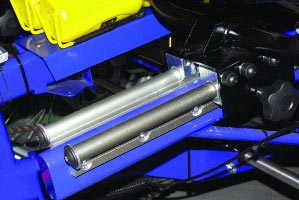
Profile round guide “DryLin® WS16” for the simple seat adjustment
The company has continually developed since its origins in 1992. “When we started our specialist bicycle market back then with the target group 'people with a handicap', there were only ugly models,” recalls Martin Bombik. “The bikes in those days were neither technically advanced nor suitable for disabled people, in fact they were unattractive and expensive. ” The company has been designing its own models since 1994. In 2001 the specialist supplier moved to its present site in Achern/Baden with six employees. The team now consists of twenty employees in production, sales and administration. Ideas for new bike models emerge in its own workshop. “Our aim is to offer a safe bike, which is intuitive and easy to operate, for every handicap. The models are technically high quality and can be used for a long time. They can be fitted with an electric motor when bought or also retrospectively,” reports Werner Müller.
“We offer products that are safe, good-looking and ergonomic,” says Martin Bombik. On the one hand they honor the absolutely necessary reliability, on the other hand they ensure the required safety in road traffic due to their stability. In order to guarantee these totally essential requirements at all times, the company puts its trust in the freedom from maintenance and lubricants and hence the long service life of plastic plain bearings. “We can't allow any compromises, but instead we rely solely on components suitable for industrial applications,” the engineer makes it clear. Three reasons are decisive for this: reliability as already mentioned, environmental influences and cost-effectiveness. Disabled people are dependent on the permanent availability of their means of transport, which are used from the North Cape to Dubai and hence under extreme environmental conditions. They must work both under extreme cold and also heat. In some circumstances, for example in our latitudes, a high level of humidity is added to this. “And if the components are supplied across the board, they are naturally more cost-effective,” points out Werner Müller about the economic aspect.
The specialist bikes are used around 50 % in the personal sector, the rest is spread over disabled-friendly hotels plus care and rehabilitation institutes. “Above all, their easy handling of course plays a particularly important role. The seat adjustment, for example, must be as simple as possible. No tools must be used, otherwise the means of transport are left unused in a corner,” explains Martin Bombik. Maintenance must not be an issue either. “The focus is on therapy in equipment that caters for handicapped people. All aids must work without restrictions. “
As a rule, the special bikes have an operating time of at least 15 years. They are brightly colored and do not need to hide behind normal bikes. “We place a lot of emphasis on design and aesthetics,” reports Martin Bombik.
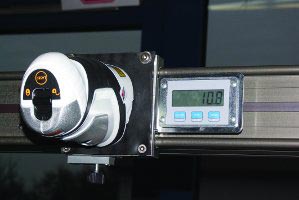
Maintenance-free mechatronics: the “DryLin® W” measuring system from igus® GmbH, Cologne, is used to check the frames.
The round “DryLin® WS-16” individual rail is used in the seat adjustment. The seat can now be infinitely adjusted to the height in question without tools, just like in a car. The maintenance-free rail solution with two quick releases substitutes screws, which firstly required a tool to be used to adjust them and secondly had too much play whilst riding. “That is too unsafe in the long run. Our seats, which must be safe, firm and stable, are designed for a body weight of 175 kg. The easier and less complicated it is to handle the bikes, the higher the usefulness for the person concerned,” says Martin Bombik making a simple calculation.
Trikes that cater for older people have two wheels either at the front or back, which can be pushed together in order that they can be put away in a tight space or transported in a car. To quickly fold up the articulated strut, plastic rod end bearings from igus® are used, which among other things are distinguished by a high fatigue strength in the face of varying loads. They also compensate for edge loads and misalignments. “The freedom from play is once again an issue here. The whole system must not wobble when folded out, otherwise the rider will not feel good, his safety is not guaranteed, and the bike will be left unused in the corner,” explains Martin Bombik. Particular attention is paid to the high quality of the frames. For well over a year, the transportable “DryLin® W” measuring system has been used to spatially measure the base frames. The plan is to transfer the variable system to the suppliers too. “We get our frames from all over the world. The measuring system can be used to check the quality, which improves internal procedures and will minimize any friction losses,” says Martin Bombik confidently. The economical all-round plain bearing made of the material “iglidur® G”, which is suitable for almost all applications, also shows its multifunctionality in the cycles. Resistant to dirt, it shows its strengths under high loads in the pedals and the seat suspension. And the PMA protective hose guides the hydraulic brake cables safely and tidily for the front and rear brakes as well as the motor cable.
“Straightening the body and keeping it in a symmetrical position, is one objective of our orthotic,” explains Werner Müller. As a training unit, it helps to get stroke patients moving and improve their motor function. The arm is fitted correctly and stably and yet can follow the body's movements: sliding continuously forwards and backwards, outwards and in front of the body. The flexible and light “DryLin® N40” low profile linear guide is used in the glide rail. A through bore simply had to be relocated. “One call with igus® was enough and the matter was done immediately,” recalls Martin Bombik. “Special adaptations are part of our daily agenda. We therefore place great emphasis on flexibility and short response times. “
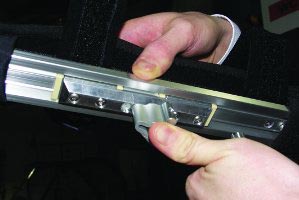
Lubricant-free “DryLin® N”low profile linear guide for the orthotic.
“Further ways of using our plastic plain bearings, such as in the seat length adjustment area and in the orthotic, are being worked on at the moment,” says the technical sales advisor from the igus® office in Baden, Dominik Hartmann. “We are always talking to each other. ” The plastic bearings' freedom from maintenance and lubricants, their long service life, the low weight and corrosion resistance play an important role for the manufacturer of the specialist bikes. “We carry a lot of responsibility. Our customers trust us. We want to make their lives worth living and guarantee their mobility. That is why our bikes must work safely and reliably under any circumstances. And because we invest a lot of time in product development, there are still a host of way of making the most of the technical benefits of plastic plain bearings,” confirms Martin Bombik in conclusion.